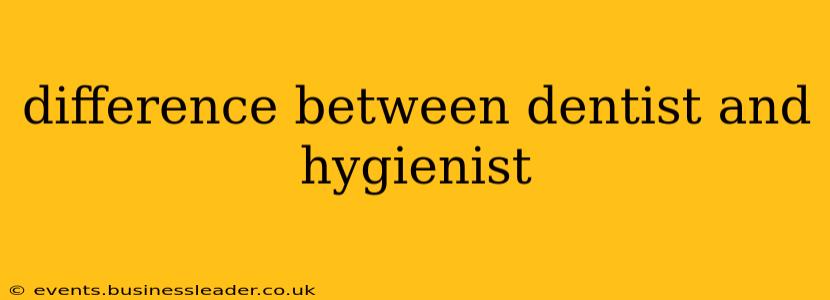Choosing the right dental professional for your needs is crucial for maintaining optimal oral health. While both dentists and dental hygienists play vital roles in your dental care, their education, responsibilities, and scope of practice differ significantly. This article clarifies the distinctions between these two essential members of your dental healthcare team.
What Does a Dentist Do?
Dentists are the primary care providers for your oral health. They are licensed medical professionals who have completed extensive education and training, including a Doctor of Dental Surgery (DDS) or Doctor of Dental Medicine (DMD) degree. This rigorous training equips them with the skills to diagnose, prevent, and treat a wide range of oral conditions.
A dentist's responsibilities include:
- Diagnosing and treating oral diseases and conditions: This includes cavities, gum disease, oral cancer, temporomandibular joint (TMJ) disorders, and more.
- Performing complex procedures: Dentists carry out procedures like extractions, root canals, fillings, crowns, bridges, dentures, and implants.
- Developing and executing treatment plans: They create personalized plans based on individual needs and oral health assessments.
- Prescribing medication: Dentists can prescribe antibiotics, pain relievers, and other medications related to oral health.
- Providing preventative care: While hygienists handle much of the preventative care, dentists oversee the overall preventative strategy and perform important preventative procedures.
- Managing emergencies: They handle dental emergencies such as knocked-out teeth or severe pain.
What Does a Dental Hygienist Do?
Dental hygienists are licensed healthcare professionals who work under the supervision of a dentist. They play a critical role in maintaining patients' oral health by focusing on preventative care and education. Their educational requirements typically involve an associate's or bachelor's degree in dental hygiene.
A dental hygienist's responsibilities primarily include:
- Providing preventative care: This is their main focus, including cleaning teeth (scaling and polishing), removing plaque and tartar, and applying fluoride treatments.
- Educating patients on oral hygiene: They teach patients proper brushing, flossing, and other techniques to maintain healthy teeth and gums.
- Taking X-rays: Dental hygienists are often trained to take and develop dental X-rays, aiding in the dentist's diagnostic process.
- Charting the patient's oral health: Recording details like gum health, presence of cavities, and other relevant information.
- Applying sealants: Protecting teeth from decay by applying sealant to the chewing surfaces of molars.
What are the Educational Requirements?
The significant difference in responsibilities stems from the vastly different educational pathways:
- Dentist: Requires a four-year undergraduate degree followed by four years of dental school, resulting in a DDS or DMD degree. Further specialized training may be pursued in areas like orthodontics, periodontics, or oral surgery.
- Dental Hygienist: Requires an associate's or bachelor's degree in dental hygiene, which typically takes two to four years to complete. Further certifications or specializations are also possible.
What is the Scope of Practice?
Dentists have a much broader scope of practice, encompassing diagnosis, treatment, and complex procedures. Dental hygienists work under the supervision of a dentist and focus on preventative care and assisting the dentist. They cannot diagnose or treat conditions independently.
Who Should I See for What?
- Routine cleanings and check-ups: Begin with a dental hygienist. They'll perform a cleaning and preliminary exam, reporting their findings to the dentist.
- Diagnosis and treatment of dental problems: See a dentist. Only a dentist can diagnose and treat conditions like cavities, gum disease, or more complex issues.
- Dental emergencies: Always contact a dentist immediately.
- Cosmetic dentistry: Consult with a dentist for options like teeth whitening or veneers.
This comprehensive overview highlights the distinct roles of dentists and dental hygienists. Both are crucial for maintaining your oral health, working together to provide comprehensive and effective care. Remember to schedule regular checkups with your dentist to maintain optimal oral health.
